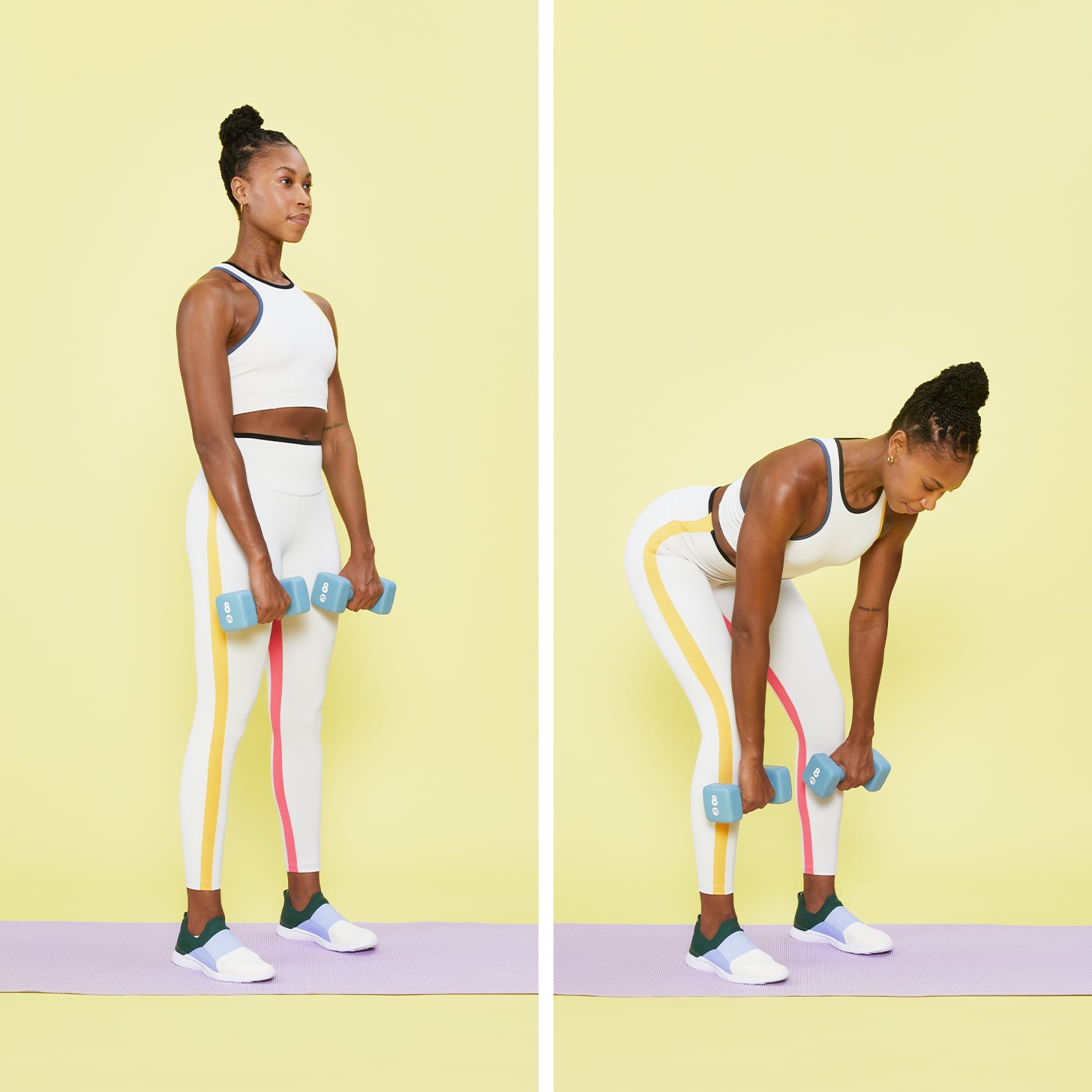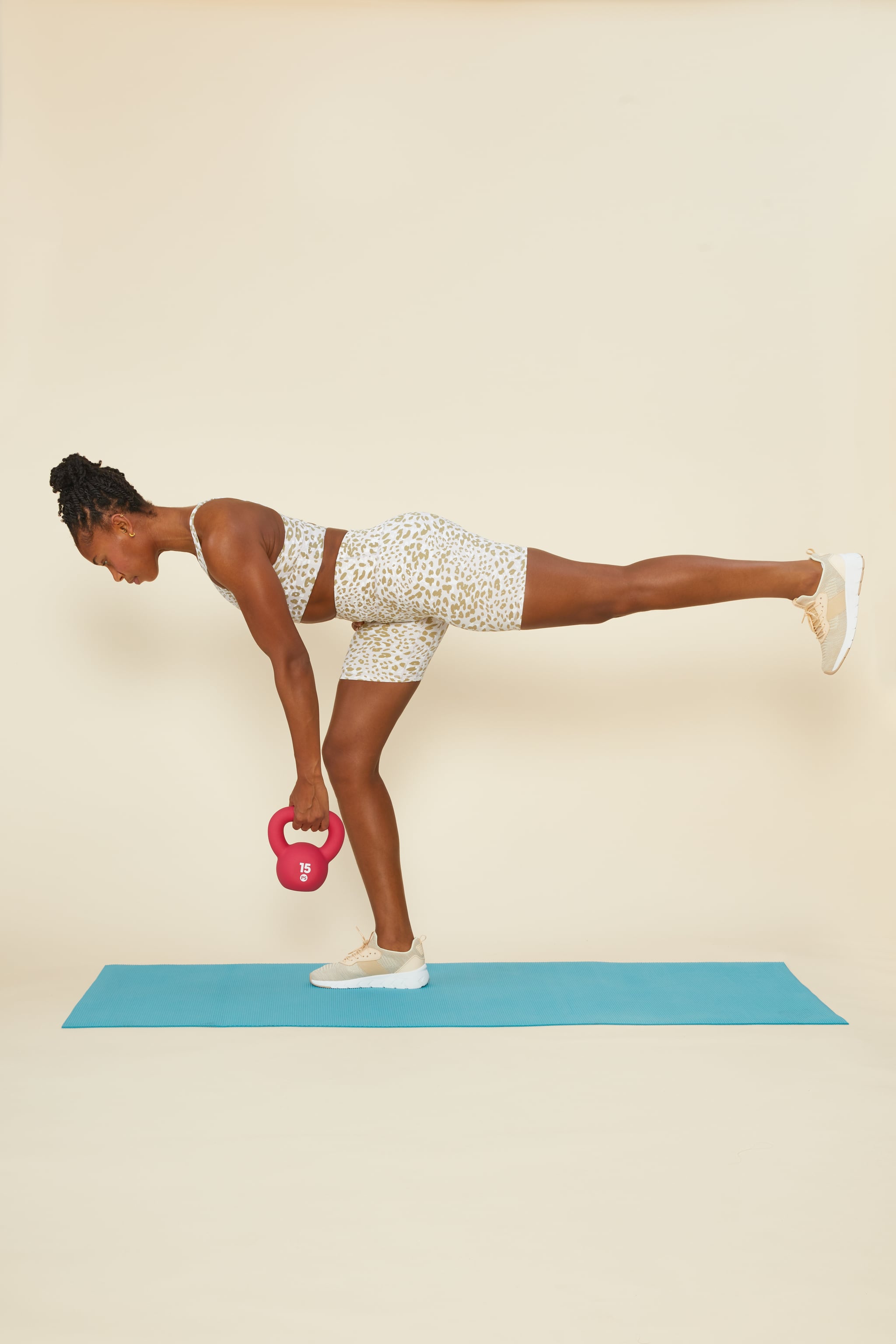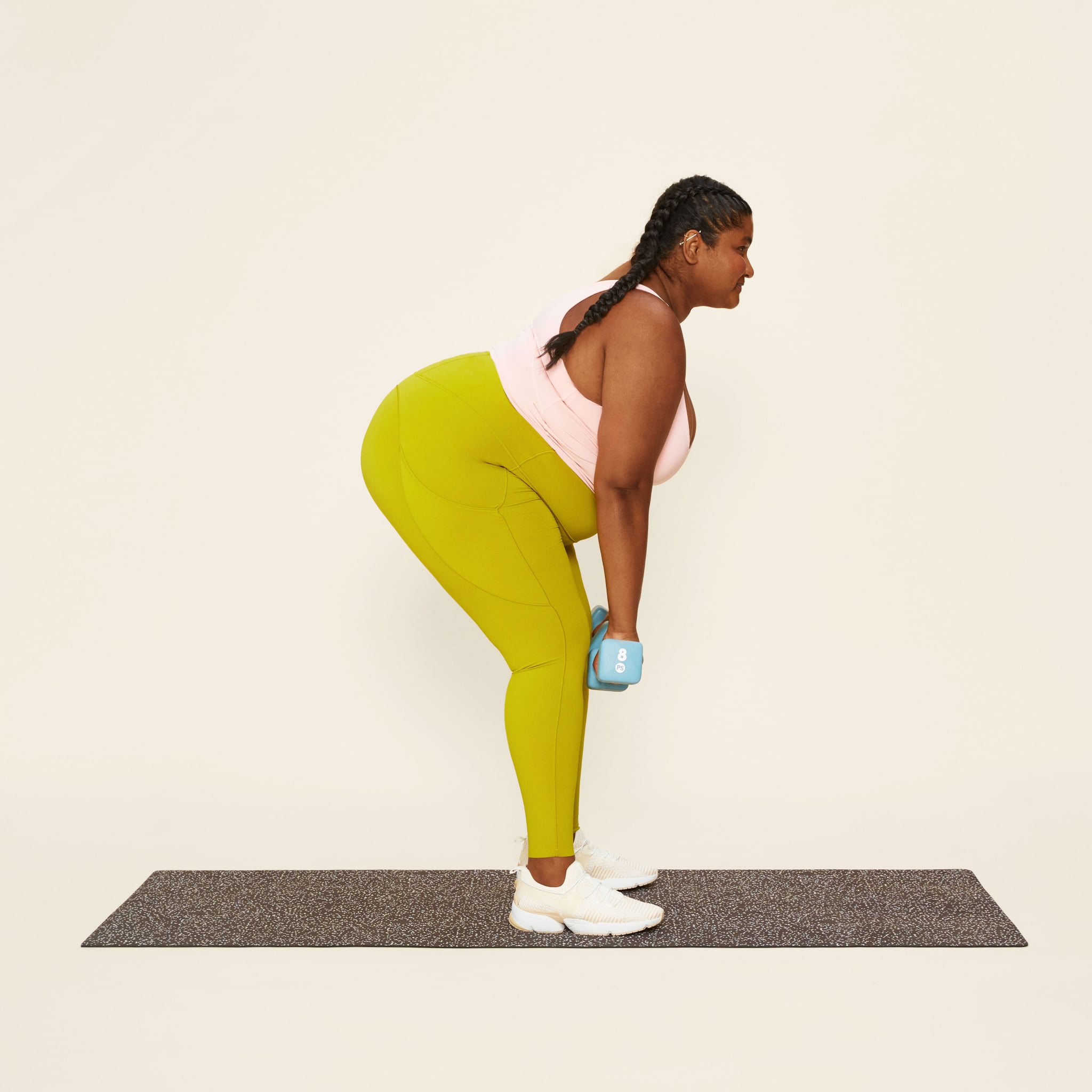Image Source: POPSUGAR Photography / Sam Kang. Product credits: POPSUGAR 8lb dumbbells, Halara sports bra, Lululemon leggings, Avre sneakers.
Sick of doing traditional deadlifts? Trying to strengthen your hamstrings? Just love the sound of the acronym RDL? If so, you’re going to love Romanian deadlifts. This move is a great way to break up the tedium of traditional deadlifts, put extra focus to your hamstrings, and get better at the hip hinge movement. Plus, they’re beginner-friendly, and you can do them at home with dumbbells or a kettlebell.
We spoke with Grace Taylor PT, DPT at H&D Park Slope in New York City to learn how to do a Romanian deadlift properly, the difference between Romanian deadlifts and traditional deadlifts, and tips on variations to try.
Romanian Deadlift: Muscles Worked & Benefits
Romanian deadlifts target your entire posterior chain (the muscles along the back of your body), but specifically your hamstrings (the muscles along the backs of your thighs) and glutes. They also activate your core muscles and spinal erectors (the muscles that run alongside your vertebrae) in order to protect your lower spine.
One huge perk of the Romanian deadlift (sometimes called RDLs) is that it encourages the hip hinge motion while maintaining a neutral spine — a movement pattern a lot of people don’t know how to do. Learning this motion properly can help you get the most out of other exercises that rely on the hip hinge — such as glute bridges or hip thrusts — and also optimize your movement during other daily activities, like vacuuming and lifting groceries or heavy laundry baskets.
If you do Romanian deadlifts consistently, they can also help maintain posterior chain flexibility, especially in your hamstrings. Lastly, they can also help improve your grip strength, which is a huge functional benefit that complements most gym activities and is even linked to a longer lifespan.
Romanian Deadlift vs. Traditional Deadlift
While these moves both strengthen your posterior chain, they function differently and put emphasis on different muscles.
For one, in Romanian deadlifts, you typically start standing up, holding the weights in front of your thighs with your knees slightly bent; with traditional deadlifts, you typically start with the barbell or kettlebell on the ground, and your starting position mimics that of a squat. Romanian deadlifts are more focused on bending at the hip, whereas conventional deadlifts require you to bend both your hips and knees simultaneously.
In terms of muscles worked, both Romanian deadlifts and conventional deadlifts work your hamstrings and glutes; however, Romanian deadlifts really emphasize your hamstrings and traditional deadlifts allow your quads (the muscles on the front of your thigh) to do some work, too.
Because so many large muscle groups are working during regular deadlifts, it’s considered a compound exercise that has serious potential for strength and power development. You can also work up to lifting really heavy in a traditional deadlift. On the other hand, Romanian deadlifts are a little more targeted, likely won’t be as heavy in terms of weight lifted, and also have less of a learning curve. For this reason, while both Romanian deadlifts and traditional deadlifts have a place in your routine, RDLs are generally more suitable for beginners. All that said, “working with a professional who can evaluate an individual’s flexibility restrictions, strength limitations, and ultimate strength goals can help determine which move is a better fit,” Taylor says.
Romanian Deadlift Form Tips
Maintaining a neutral spine is key, and both engaging your core and keeping your shoulders back helps with this. The focus in this move is on the hip hinge (aka bending at your hips), so make sure you don’t bend too much at the knees, allow your back to arch or round, or bring your chest too far forward. To practice that hip hinge motion, try this drill: stand about six inches away from a wall, facing away from it. Keeping your back straight and knees slightly bent, bend forward at the hips and reach your butt backward until it taps the wall. Squeeze your glutes to stand up straight. You should feel this same “hips back” feeling when you do RDLs.
Whether you’re doing Romanian deadlifts with a barbell, dumbbell, or kettlebell, it’s also important keep the weight close your body (think: right along the front of your shins). Taylor recommends starting with just a barbell, or two dumbbells if the bar is too heavy. Maintaining a good pace, and not completing the movement too quickly, is also important for keeping the pressure off your spine, she says.

Image Source: POPSUGAR Photography / Sam Kang. Product credits: POPSUGAR dumbbells, Splits59 sports bra, Splits59 leggings, APL sneakers.
How to Do a Romanian Deadlift
Here’s exactly how to do a Romanian deadlift using dumbbells with proper form, according to Taylor. See the image above for a visual of proper Romanian deadlift form.
- Start standing with your feet shoulder-width apart, toes facing forward. Hold a dumbbell in each hand in front of your thighs with your elbows straight and palms facing your thighs.
- Squeeze your shoulder blades together and engage your core without holding your breath. Ensure there is a slight bend in both of your knees and inhale while you slowly sit your hips back as if trying to touch the wall behind you.
- Lower the dumbbells along the front of your thighs, keeping the weight close to your body. Stop when the weights are just below knee level, or until you feel a slight stretch in the back of both thighs.
- Exhale and drive your hips forward, engaging your hamstrings and glutes to lift your chest and return to standing.
Romanian Deadlift Variations
If you don’t have a barbell or dumbbells, you can also perform Romanian deadlifts with a kettlebell: hold the kettlebell in front of your body by the handle, with both hands.
To make them more challenging, you can also try single-leg Romanian deadlifts, as shown below. To perform these, hold a weight in one hand opposite your standing leg. Shift your weight onto that standing leg while maintaining a slight bend in that knee. Hinge at your hip, the same way you would with a traditional deadlift, while extending the opposite leg behind you. Attempt to drop the weight far enough so that you are parallel to the ground. Single-leg deadlifts put a greater emphasis on balance and stability.
You can also change up your stance with a sumo Romanian deadlift. Just like a regular sumo deadlift or sumo squat, you’ll stand with your feet wider than shoulder-width apart and slightly turned out. Hold the weight at the inside of your thighs. Remember to still hinge at your hips; don’t bend much at your knees.
If you’re using a barbell, you can also try a snatch grip deadlift, which increases activation in your upper back and shoulders. To do so, you perform an RDL but with your hands much wider on the barbell.

Image Source: POPSUGAR Photography / Sam Kang. Product credits: Cream Yoga sports bra, Cream Yoga biker shorts, Avre sneakers, POPSUGAR kettlebell.
Image Source: POPSUGAR Photography / Sam Kang
Product Credit: POPSUGAR 3lb, 8lb dumbbells, Halara sports bra, Lululemon leggings, Avre sneakers
